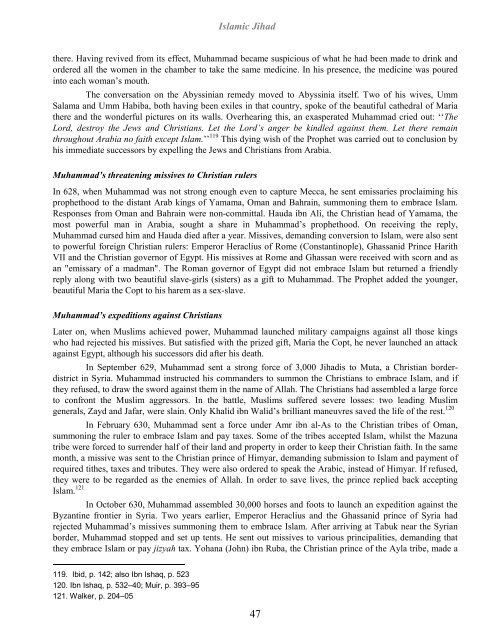islamic-jihad-legacy-of-forced-conversion-imperialism-slavery
islamic-jihad-legacy-of-forced-conversion-imperialism-slavery
islamic-jihad-legacy-of-forced-conversion-imperialism-slavery
- No tags were found...
You also want an ePaper? Increase the reach of your titles
YUMPU automatically turns print PDFs into web optimized ePapers that Google loves.
Islamic Jihadthere. Having revived from its effect, Muhammad became suspicious <strong>of</strong> what he had been made to drink andordered all the women in the chamber to take the same medicine. In his presence, the medicine was pouredinto each woman’s mouth.The conversation on the Abyssinian remedy moved to Abyssinia itself. Two <strong>of</strong> his wives, UmmSalama and Umm Habiba, both having been exiles in that country, spoke <strong>of</strong> the beautiful cathedral <strong>of</strong> Mariathere and the wonderful pictures on its walls. Overhearing this, an exasperated Muhammad cried out: ‘‘TheLord, destroy the Jews and Christians. Let the Lord’s anger be kindled against them. Let there remainthroughout Arabia no faith except Islam.’’ 119 This dying wish <strong>of</strong> the Prophet was carried out to conclusion byhis immediate successors by expelling the Jews and Christians from Arabia.Muhammad’s threatening missives to Christian rulersIn 628, when Muhammad was not strong enough even to capture Mecca, he sent emissaries proclaiming hisprophethood to the distant Arab kings <strong>of</strong> Yamama, Oman and Bahrain, summoning them to embrace Islam.Responses from Oman and Bahrain were non-committal. Hauda ibn Ali, the Christian head <strong>of</strong> Yamama, themost powerful man in Arabia, sought a share in Muhammad’s prophethood. On receiving the reply,Muhammad cursed him and Hauda died after a year. Missives, demanding <strong>conversion</strong> to Islam, were also sentto powerful foreign Christian rulers: Emperor Heraclius <strong>of</strong> Rome (Constantinople), Ghassanid Prince HarithVII and the Christian governor <strong>of</strong> Egypt. His missives at Rome and Ghassan were received with scorn and asan "emissary <strong>of</strong> a madman". The Roman governor <strong>of</strong> Egypt did not embrace Islam but returned a friendlyreply along with two beautiful slave-girls (sisters) as a gift to Muhammad. The Prophet added the younger,beautiful Maria the Copt to his harem as a sex-slave.Muhammad’s expeditions against ChristiansLater on, when Muslims achieved power, Muhammad launched military campaigns against all those kingswho had rejected his missives. But satisfied with the prized gift, Maria the Copt, he never launched an attackagainst Egypt, although his successors did after his death.In September 629, Muhammad sent a strong force <strong>of</strong> 3,000 Jihadis to Muta, a Christian borderdistrictin Syria. Muhammad instructed his commanders to summon the Christians to embrace Islam, and ifthey refused, to draw the sword against them in the name <strong>of</strong> Allah. The Christians had assembled a large forceto confront the Muslim aggressors. In the battle, Muslims suffered severe losses: two leading Muslimgenerals, Zayd and Jafar, were slain. Only Khalid ibn Walid’s brilliant maneuvres saved the life <strong>of</strong> the rest. 120In February 630, Muhammad sent a force under Amr ibn al-As to the Christian tribes <strong>of</strong> Oman,summoning the ruler to embrace Islam and pay taxes. Some <strong>of</strong> the tribes accepted Islam, whilst the Mazunatribe were <strong>forced</strong> to surrender half <strong>of</strong> their land and property in order to keep their Christian faith. In the samemonth, a missive was sent to the Christian prince <strong>of</strong> Himyar, demanding submission to Islam and payment <strong>of</strong>required tithes, taxes and tributes. They were also ordered to speak the Arabic, instead <strong>of</strong> Himyar. If refused,they were to be regarded as the enemies <strong>of</strong> Allah. In order to save lives, the prince replied back acceptingIslam. 121 In October 630, Muhammad assembled 30,000 horses and foots to launch an expedition against theByzantine frontier in Syria. Two years earlier, Emperor Heraclius and the Ghassanid prince <strong>of</strong> Syria hadrejected Muhammad’s missives summoning them to embrace Islam. After arriving at Tabuk near the Syrianborder, Muhammad stopped and set up tents. He sent out missives to various principalities, demanding thatthey embrace Islam or pay jizyah tax. Yohana (John) ibn Ruba, the Christian prince <strong>of</strong> the Ayla tribe, made a119. Ibid, p. 142; also Ibn Ishaq, p. 523120. Ibn Ishaq, p. 532–40; Muir, p. 393–95121. Walker, p. 204–0547


